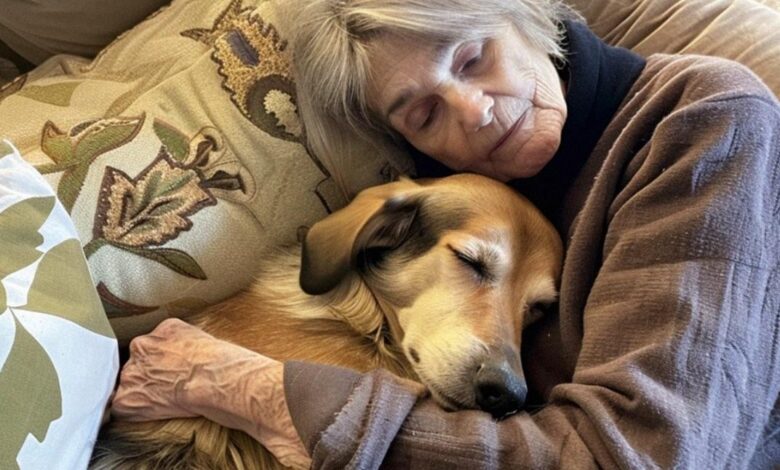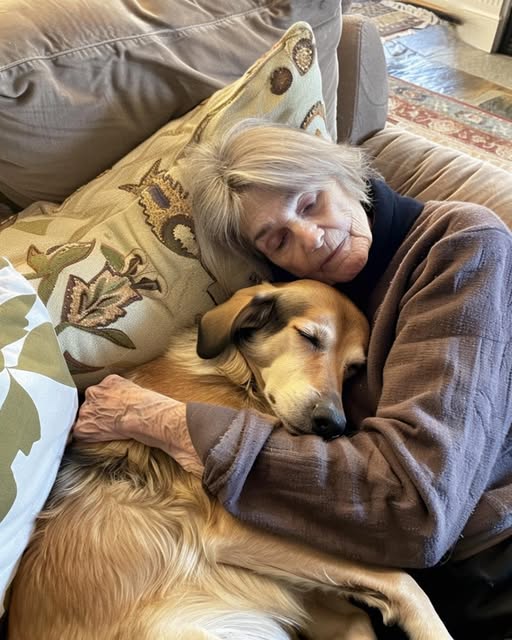
When my grandmother passed away, my family didn’t mourn — they swarmed. The same people who hadn’t visited her in years suddenly filled her house, whispering about inheritance. They weren’t there to say goodbye. They were there for the money.
I was the only one who brought something else out of her home — her old dog, Berta.
Berta was a gray-haired shepherd mix with tired eyes and a limp, but she had been Grandma’s shadow for as long as I could remember. She was more than a pet. She was Grandma’s heart.
As the casket lowered into the ground, I held Berta’s leash tightly. She whimpered, pulling toward the grave, as if she understood she was losing the only person who’d ever truly loved her.
Grandma had lived a life built on discipline. She’d made her fortune from nothing, and she never let anyone forget it. She didn’t believe in handouts — not for her children, not for her grandchildren.
Instead, she paid for our education. That was her way of helping: teaching us to stand on our own feet.
The others hated her for it. My mother called her selfish. My uncle said she was manipulative. But I knew better. She was strict, yes, but she believed in effort over entitlement.
I was the only one who still visited her.
When she grew sick, I moved in to care for her — working night shifts as a nurse, sleeping a few hours, then tending to her medicine, meals, and comfort. It wasn’t easy, but I owed her that.
She’d always told me, “Meredith, life tests us when no one’s watching. That’s when your true character shows.”
After the funeral, everyone crowded into Grandma’s house for the reading of the will. The air was thick with greed.
My mother sat in the corner, arms crossed. Uncle Jack and Aunt Florence whispered by the window. My cousins, Tom and Alice, scrolled on their phones, pretending not to care.
The doorbell rang. No one moved, so I opened it.
Mr. Johnson, Grandma’s lawyer, stood on the porch — a small man in a neat gray suit. He stepped inside, briefcase in hand.
“Thank you all for coming,” he said. “I’ll be brief.”
Everyone leaned forward.
Mr. Johnson adjusted his glasses. “Cassandra left no inheritance to any of you.”
The room erupted.
“What do you mean none?” my mother snapped. “We’re her family!”
“She must have left something,” Uncle Jack barked.
Mr. Johnson remained calm. “Her estate has been handled according to her explicit instructions. None of you are beneficiaries.”
Gasps and curses filled the air.
“That old witch!” my uncle shouted.
“Don’t speak about her like that,” I said quietly.
Mom turned on me. “You would defend her, wouldn’t you? She probably left everything to you.”
I shook my head. “I don’t know anything.”
“Liar,” she spat.
Before I could respond, Berta barked sharply. Everyone turned toward her.
“Oh, right,” Aunt Florence said, rolling her eyes. “What about the dog?”
“Put her down,” Mom said flatly.
I felt something twist inside me. “You can’t do that. Grandma loved her.”
“She’s old,” Uncle Jack said. “It’s the humane thing to do.”
“No,” I said firmly. “I’ll take her.”
They laughed. “Fine,” my mother sneered. “Take the mutt. She’s all you’ll ever get.”
That night, Berta lay curled on my couch, whimpering in her sleep. I stroked her fur and whispered, “It’s okay, girl. I’ve got you.”
For days, I tried to settle into a routine — work, walk the dog, come home to silence. I missed Grandma more than I’d expected. The house felt emptier than ever.
Then, one evening, someone banged on my door.
It was my mother.
Her eyes were wild. “Where is it?” she demanded.
“Where’s what?”
“The money! The house! The will! Don’t play dumb. You lived with her — she must’ve left everything to you.”
“Mom,” I said softly, “she didn’t. All I got was Berta.”
“Don’t lie to me!” she screamed. “You owe me that money — I gave birth to you!”
“I have nothing,” I said, tears burning my eyes.
She glared, then stormed off. “You’ll regret this,” she hissed before slamming the door.
I sank to the floor, shaking. Berta climbed into my lap, pressing her nose into my arm as if to say, I’m here.
That’s when I noticed her collar.
It was old and worn, but something about it caught my eye — a tiny metal tag with an address engraved on the back. Underneath was a number: 153.
A locker number.
The next morning, I drove straight to the train station listed on the tag. My heart pounded as I scanned the rows of metal lockers until I found 153.
But I didn’t have a key.
I sat on the bench, staring at the tag, until a thought hit me. The tag looked… thicker than normal. I pried it open — and a tiny brass key dropped into my hand.
It fit perfectly.
Inside the locker was a folder labeled: For Meredith.
My hands trembled as I opened it. Inside was a handwritten letter in Grandma’s familiar looping script.
My dearest Meredith,
I wanted to leave what I’ve built to someone who understands love, not greed. The one who takes care of Berta will inherit everything I own. I trust that person will be you.
You were the only one who stood by me. Use what I leave you wisely — not for comfort, but for kindness.
With love, Grandma.
Tears blurred the words. Beneath the letter were official papers — the true will, property deeds, and bank documents.
I was still processing it when a voice behind me said, “I knew it.”
I turned to see my mother — and my uncle, both glaring.
“Hand it over,” Uncle Jack said. “You’re too naive to handle that kind of money.”
“I won’t,” I said, clutching the folder.
Before they could move, another voice echoed across the station. “That won’t be necessary.”
It was Mr. Johnson.
He held up his phone. “The locker’s sensor alerted me when it was opened. I suspected something like this.”
“This isn’t fair!” my mother shrieked. “I’m her daughter!”
“Cassandra’s will clearly states,” the lawyer said calmly, “that her estate belongs to whoever took Berta — without knowing there was an inheritance. That person is Meredith. Interfering could be considered fraud.”
Uncle Jack cursed under his breath. My mother glared at me one last time before storming off.
Mr. Johnson smiled gently. “Your grandmother was clever. She wanted to reward love — not blood.”
We walked outside together, the folder heavy in my hands.
“Why hide it like that?” I asked.
He smiled. “Because she knew your family. And she knew you.”
I nodded, thinking of Grandma’s words — about strength, decency, and rising from nothing.
“I’ll donate most of it to the hospital,” I said. “That’s what she’d want.”
Mr. Johnson nodded. “I think she already knew you would.”
As I drove home, Berta rested her head on my lap. For the first time in months, I felt peace.
Grandma had left more than money. She’d left a lesson — that kindness, not greed, is the real inheritance worth fighting for.
And as Berta looked up at me with those soft, knowing eyes, I realized Grandma had never really left at all.
She’d just found a new way to stay.
